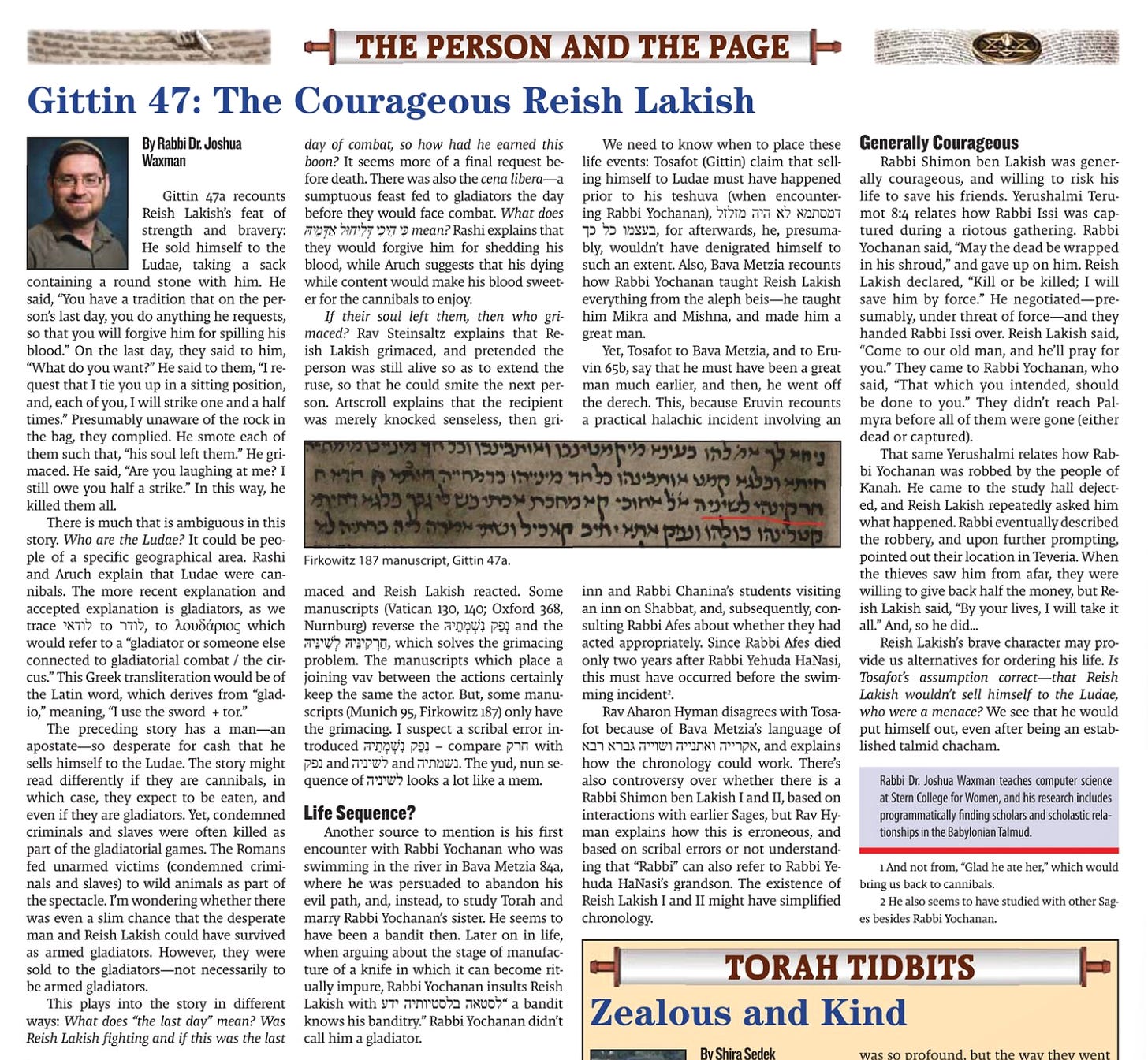Here is a summary of my article in the Jewish Link from last Shabbos. You can read it in full here (HTML, flipdocs, paid Substack). Or you can click on the image below to expand it.
(1) Here is the gemara under discussion. We can see it in full since we aren’t as constrained by space. Gittin 47a:
רֵישׁ לָקִישׁ זַבֵּין נַפְשֵׁיהּ לְלוּדָאֵי, שְׁקַל בַּהֲדֵיהּ חַיְיתָא וְגֻלְגֻּלְתָּא, אֲמַר: גְּמִירִי דְּיוֹמָא בָּתְרָא כֹּל דְּבָעֵי מִינַּיְיהוּ עָבְדִי לֵיהּ, כִּי הֵיכִי דְּלֵיחוּל אַדְּמֵיהּ.
The Gemara recounts a related incident: Reish Lakish sold himself to gladiators. He took a bag and a round stone inside of it with him. He said: There is a tradition that on the final day of a captive’s life, before his captors kill him, they do for him anything that he requests of them, so that he would forgive them for the spilling of his blood.
יוֹמָא בָּתְרָא אֲמַרוּ לֵיהּ: מַאי נִיחָא לָךְ? אֲמַר לְהוּ: בָּעֵינָא אֶקְמְטִינְכוּ וְאוֹתְבִינְכוּ, וְכֹל חַד מִינַּיְיכוּ אֶמְחְיֵהּ חַיְיתָא וּפַלְגָא. קַמְטִינְהוּ וְאוֹתְבִינְהוּ, כֹּל חַד מִינַּיְיהוּ כַּד מַחְיֵיהּ חַד חַיְיתָא נְפַק נִשְׁמְתֵיהּ. חַרְקִינֵּיהּ לְשִׁינֵּיהּ, אֲמַר לֵיהּ: אַחוֹכֵי קָא מְחַיְּיכַתְּ בִּי? אַכַּתִּי פָּשׁ לָךְ גַּבַּי פַּלְגָא דְּחַיְיתָא. קַטְלִינְהוּ כּוּלְּהוּ.
On the final day before they were set to kill him they said to him: What is amenable to you? He said to them: I want to tie you up and have you sit, and I will strike each one of you one and a half times. He tied them up and had each one of them sit. When he struck each of them with one strike with the stone in the bag, the one whom he struck died, because Reish Lakish was of great strength. Reish Lakish gritted his teeth in anger, and said to the one whom he killed, in order to prevent the others from realizing what was happening: Are you laughing at me? You still have half of a strike remaining with me, as I struck you only once. He killed them all, and Reish Lakish escaped his captors.
נְפַק וַאֲתָא, יָתֵיב קָאָכֵיל וְשָׁתֵי. אֲמַרָה לֵיהּ בְּרַתֵּיה: לָא בָּעֵית מִידֵּי לְמִזְגֵּא עֲלֵיהּ? אֲמַר לַהּ: בִּתִּי, כְּרֵיסִי כָּרִי. כִּי נָח נַפְשֵׁיהּ שְׁבַק קַבָּא דְמוֹרִיקָא, קְרָא אַנַּפְשֵׁיהּ: ״וְעָזְבוּ לַאֲחֵרִים חֵילָם״.
He left and came back home, and after some time had passed he was sitting, eating, and drinking, without concern for his livelihood. His daughter said to him: You don’t want something to lie upon? He said to her: My daughter, my belly is my pillow, and this is enough for me. When he died he left only a kav of saffron as an inheritance, and even so he recited this verse about himself: “And they leave their wealth for others” (Psalms 49:11), meaning that he was pained that he did not use all of his property. He exhibited his confidence that God would provide his needs by not saving money for the future.
(2) How should we translate Ludae? Rav Steinsaltz above rendered it gladiators, which is the more modern, accepted rendition. Artscroll renders it as cannibals, following Rashi and the Aruch. (I note in a footnote that we can connect the two translations etymologically, as “glad he ate her”.)
Each interpretation would impact other parts of the story. Thus, דְּלֵיחוּל אַדְּמֵיהּ could mean “forgive him for spilling his blood” as above. The alternative, “make his blood sweeter”, works for the cannibal interpretation.
(3) There is also the strangeness of נְפַק נִשְׁמְתֵיהּ. חַרְקִינֵּיהּ לְשִׁינֵּיהּ. The Steinsaltz translation turns these into two different actors, the smitee losing his life immediately after the first strike, and the smiter gritting his teeth. Despite this, it requires that it be a ruse by the smiter, Reish Lakish. Artscroll solves the difficulty by making נְפַק נִשְׁמְתֵיהּ into a mere temporary loss of consciousness.
Perhaps this is a scribal error? Some manuscripts (Vatican 130, 140; Oxford 368, Nurnburg) reverse נְפַק נִשְׁמְתֵיהּ and the חַרְקִינֵּיהּ לְשִׁינֵּיהּ, solving the grimacing problem. Munich 95 and Firkovich 187 don’t have נְפַק נִשְׁמְתֵיהּ, only the grimacing. Compare חרק with נפק and לשיניה and נשמתיה. The yud nun sequence of לשיניה looks a lot like a mem.
(4) Tosafot places this incident as before Reish Lakish did teshuva, because he otherwise would not degrade himself to such an extent. (Again, presume cannibals.) I explore the chronology a bit. Finally, I note how the Yerushalmi discusses bold actions by Reish Lakish, to save a captured colleague; also to recover Rabbi Yochanan’s money after the latter was mugged. Both of these were after he did teshuva. So it is not so far-fetched to say he did this later in life, as a means of confronting and undermining the threatening Ludae.





